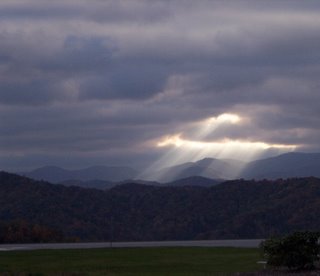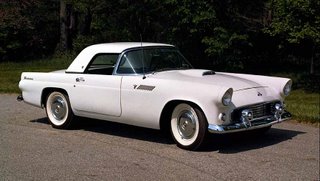The Weekend in Brief (not in briefs)
On Thursday the 5th I went home immediately after my evening class, met my sister-in-law at the house and headed for Raleigh, North Carolina. In Raleigh by 1:00 a.m., I dropped Sister off with my brother-in-law and met my cousin JP, with whom I stayed the night. We talked and laughed as we always do and watched the early morning repeat of The Colbert Report; then he pointed me to the spare room, where I was soon sound asleep.
The morning of the 6th—rain, rain, rain. Still we went out. J drove my by the church he's now attending and intending to join (
Crossroads Fellowship). We had Steak & Shake burgers for brunch, took a little tour of town and then returned to his place to hang out for a couple of hours. When he had to go to the office for an afternoon meeting, I found Highway 64 and headed for
Ahoskie, North Carolina. Rain, rain, rain, all along the way. By the time I got to Ahoskie, I was tired and ready to eat. I went to the motel where my family had a couple of rooms, and two of my aunts-in-law were at the front desk, working out rooms of their own. They'd been to the hospital where their mother—the family matriarch—wasn't doing well. It's a large family, so I knew there'd be precious little space at the hospital. I have a mental image of Grandmama that I wanted to preserve, and in order to do so I decided not to go to the hospital. Still hungry, I went to Subway, and on the way back to the motel—in a driving rain—I shaped in my mind the little poem below.
The 7th. I helped take care of my little granddaughter through part of the day, while my older son went to play some golf with his cousins. That afternoon, we got the news that Grandmama had died. (She didn't actually die at night, like the poem suggests.) It was a bittersweet time. Nobody was shocked. She was, after all, 97 years old. We went ahead with our usual Saturday evening festivities, but I could sense an unusually contemplative mood in many of the folks there. We partook of the pig that had been cooking all day.
The 8th. The weather continued gray and wet, although not much actual rain was falling. I got out that morning and went to the track at Hertford County High School (Home of the Bears) and did my walking and running. In the afternoon, the extended reunion gathering took place as scheduled but with the same bittersweet character about it. I spent the late afternoon working on a piece for an encyclopedia and that evening we went to the funeral home for the visitation. (My younger son, having had no experience with this kind of thing in the past, understood the idea but didn't know what this event was called. He referred to it as a "walk-through," which made his mother and me laugh.)
The 9th. Funeral at 11:00, handled surprisingly well by the young Baptist preacher; brief graveside service; another meal for the family—leftovers from the weekend, supplemented by the ladies of Center Grove Baptist Church. By 2:00 or so, we were on our way back to the mountains of east Tennessee. After a long long ride, we returned home at 10:00.
That's the weekend that was. It'll hopefully happen again early next October, as it has been happening for years. Having come into the family by marriage, I tend to go only every other year, but I might break that tendency and go again next time. Grandmama won't be there in person, but she was such a strong presence in her family that she can't help but be in the air of Ahoskie and in the food she taught her daughters and granddaughters to cook, in the laughter that is everywhere in that family and in the unstoppable tears that will be dried by the fabric of her family, a fabric she herself wove out of almost 100 years of life in Ahoskie.
 For Halloween, the beginning of a story about this creepy ornamental statue in the yard across the side street.
For Halloween, the beginning of a story about this creepy ornamental statue in the yard across the side street. Then she stood up and walked into the shadows without blinking or brushing the dirt from her knees. . . .
Then she stood up and walked into the shadows without blinking or brushing the dirt from her knees. . . .




















